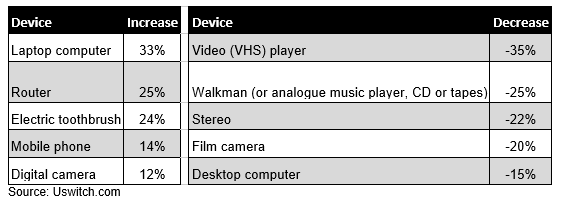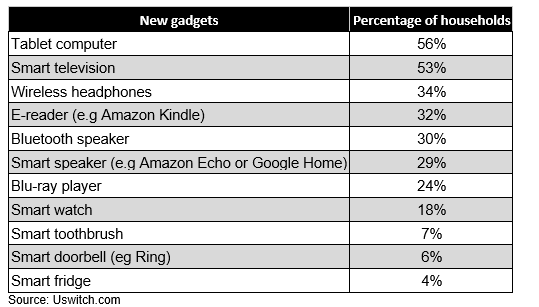17th September 2020
ONE IN FOUR CONSUMERS READY TO HAVE BRAINS SURGICALLY IMPLANTED WITH TECH BY 2040
- A quarter of people — more than 12 million — are ready to have surgically implanted technology to enhance communication within 20 years[1]
- Experts from Uswitch.com predict that neural implants will let us connect to tech using our thoughts by 2040, as it examines how gadgets have changed since the year 2000
- The cost of technology in our homes has soared 150% since the year 2000, with the average household now owning £8,500 of gadgets[2]
- Consumers mourn the loss of Ceefax, music cassettes and VHS tapes, but half don’t miss any of the gadgets from the year 2000[3]
- Social media is the invention that most people wish had never been created, with 33% of consumers regretting the rise of TikTok[4]
A quarter of people (24%) would be happy to see technology implanted in our bodies by the year 2040 to help them communicate[1], reveals research from Uswitch.com, the comparison and switching service, as it examines changes to technology since the year 2000 and looking ahead to 2040.
Brain implants like Elon Musk’s proposed Neuralink will let us control our gadgets with our thoughts and communicate at lightning-fast speeds by 2040, predict experts from Uswitch.com, as the comparison site celebrates 20 years since it started.
Consumers are spending more on gadgets than ever, with the value of household devices rising 150% since the year 2000[2] - despite the cost of computers and televisions falling during that time.
Modern households now have 11 gadgets on average, with seven connecting to the internet. Half of homes have a smart TV (53%), three in ten (29%) own a smart speaker like Alexa or Google Home and 18% have a smart watch[2].
Devices in the average modern home are now worth £8,500, up 150% from £3,400 in the year 2000[5], when consumers typically had eight gadgets[6]. At that time, televisions were found in eight out of ten homes (79%), with landline phones (73%) and mobile phones (59%) the next most popular devices. Analogue music players like Walkmans were found in a third of houses (32%), and electronic pets called Tamagotchis were cared for in one in ten (12%)[6].
Table - biggest rise and fall in ownership from 2000 to 2020
Half of consumers (50%) say they don’t miss any devices from the turn of the millennium, but others are most nostalgic about the loss of television text service Ceefax, which stopped broadcasting in 2012, with nearly one in ten people (7%) saying it was the piece of technology from 2000 they missed most. Music cassettes and VHS tapes were next most-missed, among 6% of people[3].
Table - ownership of new gadgets since 2000
Social media is the tech invention most disliked by consumers, with a third of people (33%) wishing that TikTok had never been created. Facebook (30%), Twitter (27%) and Instagram (23%) were similarly unpopular[4].
Two thirds of people (67%) say technology has made life easier over the last 20 years, and three quarters (78%) say it has helped them keep in touch with loved ones. However, less than half of people (45%) say technology has made the world a better place[7].
Consumers are most excited by the idea of 100Gbps broadband speeds for all in 20 years, with two thirds (69%) agreeing to this. Next most popular were fake trees that scrub carbon dioxide from the atmosphere, and doors that operate based on fingerprint or facial recognition, both welcomed by over half (52%) of people[1].
Uswitch.com reveals how household technology has changed since the year 2000, and will look 20 years from now, as it celebrates 20 years of helping consumers switch to better deals.
Ernest Doku, telecoms expert at Uswitch.com, comments: “Household gadgets have come a long way since the year 2000, when mobile phones were a novelty and we were only just discovering the joys of the internet.
“It was a simpler time of Tamagotchis, Walkmans and Ceefax. Now we can browse the web from the smartphones in our pocket and watch television or films on the go.
“Today, many devices we have around the house are connected directly to the internet, with households boasting smart speakers, smart fridges, and even smart toothbrushes.
“Two thirds of consumers are looking forward to the day when we can all enjoy broadband connections of 100Gbps, a speed that will help usher in truly smart homes and the rise of the Internet of Things.
“We’ve really enjoyed being part of people’s lives for the last 20 years - but it’s even more exciting to think what the next 20 years will bring. I wouldn’t be surprised to see devices linking our brains to machines to create an augmented reality, allowing us to access the internet or communicate with others using only our mind.”
Find out how our household technology will change 20 years into the future here.
For more information please contact:
Chris Thomas, Uswitch.com on 0797 447 1314 / a-chris.thomas@rvu.com
David Bullock, Rhizome Media on 07762 079092 / davidbullock@rhizomemedia.co
Notes to editors:
Opinium surveyed 2,000 UK adults from 28th August to 1st September 2020. Results were weighted to reflect a nationally representative criteria.
- Respondents were asked ‘Which of the following technologies would you be happy to see available in 2040?’ 36% said they would be ‘very happy to see’ and 33% were ‘happy to see’ 100Gbps internet for everyone, making 69% ‘happy or very happy to see’ it. 52% were ‘very happy’ or ‘happy’ to see Fake trees that scrub carbon dioxide from the atmosphere. 52% were ‘very happy’ or ‘happy’ to see ‘Fingerprint or facial recognition-enabled doors’. 24% were ‘very happy’ or ‘happy’ to see technology implanted in our bodies, while 48% were ‘unhappy’ or ‘very unhappy’ to see it.
- Respondents were asked ‘How many of the following pieces of technology does your family home have at present?’ The average number of gadgets per household was 10.9. 74% said ‘mobile phone/smartphone’, 71% said ‘television’, 67% said ‘laptop computer’.
- Respondents were asked ‘Which piece of technology from the year 2000 do you miss the most?’ 50% said ‘None – I don’t miss any of these pieces of technology’ 7% said Ceefax, 6% said music cassette tapes, 6% said VHS tapes.
- Respondents were asked ‘Which pieces of technology do you wish had never been invented?’ 33% of people said TikTok, 30% said Facebook, 27% said Twitter, 23% said Instagram.
- Prices of goods from the year 2000 were taken from median price of items in the 1999/2000 Argos catalogue, then the price corrected for inflation. Prices of modern goods were taken from Argos website.
- Respondents were asked ‘How many of the following pieces of technology did your family home have in the year 2000?’ The average number of gadgets per household was 7.81. 79% said ‘television’, 73% said ‘landline telephone’, 59% said ‘mobile phone’.
- Respondents were asked ‘To what extent do you agree with the following statements about technological advances in the last 20 years?’ 67% agreed with the statement ‘They have made life easier and more comfortable’. 78% agreed with the statement ‘They have made it easier for me to communicate and stay in touch with friends and/or family’. 45% agreed with the statement ‘They have made the world a better place’.
About Uswitch - saving you money for 20 years
Uswitch is the UK’s top comparison website for home services switching. We’ve saved consumers £2.5 billion off their energy bills since we launched in September 2000, and also help people find a better deal on their broadband, mobile, TV and financial services products.
Uswitch is part of RVU, a UK business that also owns Money.co.uk, Bankrate and Save on Energy.
If you would no longer like to receive these emails please reply with 'unsubscribe'.



